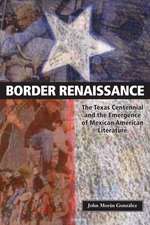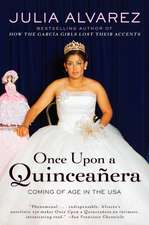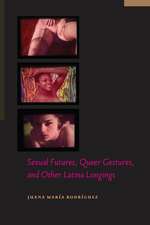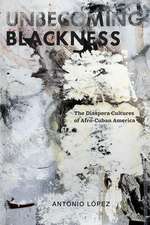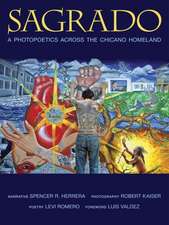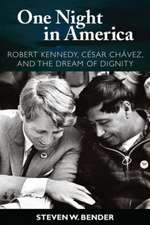Latinos and Education: A Critical Reader
Editat de Antonia Darder, Rodolfo D. Torresen Limba Engleză Paperback – 11 noi 2013
Latinos and Education: A Critical Reader is a must-read collection for a new generation of students in education, Latino studies, and sociology.
| Toate formatele și edițiile | Preț | Express |
|---|---|---|
| Paperback (1) | 593.04 lei 6-8 săpt. | |
| Taylor & Francis – 11 noi 2013 | 593.04 lei 6-8 săpt. | |
| Hardback (1) | 1291.50 lei 6-8 săpt. | |
| Taylor & Francis – 19 noi 2013 | 1291.50 lei 6-8 săpt. |
Preț: 593.04 lei
Preț vechi: 697.69 lei
-15% Nou
Puncte Express: 890
Preț estimativ în valută:
113.49€ • 123.24$ • 95.33£
113.49€ • 123.24$ • 95.33£
Carte tipărită la comandă
Livrare economică 23 aprilie-07 mai
Preluare comenzi: 021 569.72.76
Specificații
ISBN-13: 9780415537100
ISBN-10: 041553710X
Pagini: 408
Ilustrații: 5 tables and Women, Science and Technology 2nd edn
Dimensiuni: 178 x 254 x 23 mm
Greutate: 0.68 kg
Ediția:Revizuită
Editura: Taylor & Francis
Colecția Routledge
Locul publicării:Oxford, United Kingdom
ISBN-10: 041553710X
Pagini: 408
Ilustrații: 5 tables and Women, Science and Technology 2nd edn
Dimensiuni: 178 x 254 x 23 mm
Greutate: 0.68 kg
Ediția:Revizuită
Editura: Taylor & Francis
Colecția Routledge
Locul publicării:Oxford, United Kingdom
Cuprins
TABLES OF CONTENTS
I. HISTORY, POLITICS, & ECONOMICS
1. The Ideology and Practice of Empire: The U.S., Mexico, and the Education of Mexican Immigrants
Gilbert G. Gonzalez
2. Puerto Rican Politics in the United States: Examination of Major Perspectives and Theories
Edgardo Melendez
3. Latina/o: Historical and Material Dimensions
Peter McLaren and Nathalia E. Jaramillo
II. CONSTRUCTING IDENTITIES
4. Movimiento de Rebeldia Y Las Culturas que Traicionan
Gloria Andualdua
5. Latino/”Hispanic”—Who Needs a Name/: The Case against a Standardized Terminology
Martha E. Gimenez
6. Capitalist Schooling and Constructing Young Latino Masculinities
Rodolfo D. Torres and Alexandro Jose Gradilla
7. Dis-connections in “American” Citizenship and the Post/neo-colonial: People of Mexican Descent and Whitestream Pedagogy and Curriculum.
Luis Urrieta
III. LANGUAGE & SCHOOLING
8. The Struggle for Language Rights: Naming and Interrogating the Colonial Legacy of “English Only”
Lilia I. Bartolome
9. The Politics of Restrictive Language Policies: A Postcolonial Analysis of Language and Schooling
Antonia Darder and Miren Uriarte
10. Como Hablar en Silencio (Like Speaking in Silence): Issues of Language, Culture, and Identity of Central Americans in Los Angeles
Magaly Lavadenz
11. Entre la Espada y la Pared: Critical Educators, Bilingual Education, and Education Reform
Edward M. Olivos & Carmen E. Quintana de Valladolid
IV. TRANSFORMING EPISTEMOLOGIES
12. Toward an Epistemology of a Brown Body
Cindy Cruz
13. Thinking Latina/o Education with and from Chicana/Latina Feminist
Cultural Studies
Sofia Villenas
14. (Re)Imagining New Narratives of Racial, Labor, and Environmental
Power for Latina/o Students
Yvette Lapayese
V. EMANCIPATORY PEDAGOGIES
15. RicanStructuring the Discourse and Promoting School Success: Extending
a Theory for Culturally Responsive Pedagogy for Diasporicans
Jason G. Irizarry and Rene Antrop-Gonzalez
16. A Social Justice Approach to Achievement: Guiding Latina/o Students
Toward Educational Attainment with a Challenging, Socially Relevant
Curriculum
Julio Cammarota
17. Critical Xicana/Xicano Educators: Is it enough to be a Person of Color?
Margarita Ines Berta-Avila
VI. LATINO IMMIGRANT YOUTH
18. Latino Youth: Immigration, Education, and the Future
Pedro A. Noguera
19. Swimming: On Oxygen, Resistance and Possibility for Immigrant Youth
under Siege
Michelle Fine, Reva Jaffe-Walter, Pedro Pedraza, Valerie Futch, & Brett Stoudt
20. “I Can’t Go to College because I Don’t Have Papers”: Incorporation
Patterns of Latino Undocumented Youth
Leisy Janet Abrego
VII. COMMUNITY, RESISTANCE, & ACTIVISM
21. Culture, Literacy, and Power in Family-Community-School-Relationships
Concha Delgado Gaitan
22. Practicing Citizenship: Latino Parents Broadening Notions of Citizenship
through Participatory Research
Emma H. Fuentes
23. From Hip-Hop to Humanization: Batey Urbano as a Space for Latino
Youth Culture and Community Action
Nilda Flores-Gonzalez, Matthew Rodriguez, and Michael Rodriguez-Muniz
24. Nine Reflections for Academic Activists
Raúl Fernández
I. HISTORY, POLITICS, & ECONOMICS
1. The Ideology and Practice of Empire: The U.S., Mexico, and the Education of Mexican Immigrants
Gilbert G. Gonzalez
2. Puerto Rican Politics in the United States: Examination of Major Perspectives and Theories
Edgardo Melendez
3. Latina/o: Historical and Material Dimensions
Peter McLaren and Nathalia E. Jaramillo
II. CONSTRUCTING IDENTITIES
4. Movimiento de Rebeldia Y Las Culturas que Traicionan
Gloria Andualdua
5. Latino/”Hispanic”—Who Needs a Name/: The Case against a Standardized Terminology
Martha E. Gimenez
6. Capitalist Schooling and Constructing Young Latino Masculinities
Rodolfo D. Torres and Alexandro Jose Gradilla
7. Dis-connections in “American” Citizenship and the Post/neo-colonial: People of Mexican Descent and Whitestream Pedagogy and Curriculum.
Luis Urrieta
III. LANGUAGE & SCHOOLING
8. The Struggle for Language Rights: Naming and Interrogating the Colonial Legacy of “English Only”
Lilia I. Bartolome
9. The Politics of Restrictive Language Policies: A Postcolonial Analysis of Language and Schooling
Antonia Darder and Miren Uriarte
10. Como Hablar en Silencio (Like Speaking in Silence): Issues of Language, Culture, and Identity of Central Americans in Los Angeles
Magaly Lavadenz
11. Entre la Espada y la Pared: Critical Educators, Bilingual Education, and Education Reform
Edward M. Olivos & Carmen E. Quintana de Valladolid
IV. TRANSFORMING EPISTEMOLOGIES
12. Toward an Epistemology of a Brown Body
Cindy Cruz
13. Thinking Latina/o Education with and from Chicana/Latina Feminist
Cultural Studies
Sofia Villenas
14. (Re)Imagining New Narratives of Racial, Labor, and Environmental
Power for Latina/o Students
Yvette Lapayese
V. EMANCIPATORY PEDAGOGIES
15. RicanStructuring the Discourse and Promoting School Success: Extending
a Theory for Culturally Responsive Pedagogy for Diasporicans
Jason G. Irizarry and Rene Antrop-Gonzalez
16. A Social Justice Approach to Achievement: Guiding Latina/o Students
Toward Educational Attainment with a Challenging, Socially Relevant
Curriculum
Julio Cammarota
17. Critical Xicana/Xicano Educators: Is it enough to be a Person of Color?
Margarita Ines Berta-Avila
VI. LATINO IMMIGRANT YOUTH
18. Latino Youth: Immigration, Education, and the Future
Pedro A. Noguera
19. Swimming: On Oxygen, Resistance and Possibility for Immigrant Youth
under Siege
Michelle Fine, Reva Jaffe-Walter, Pedro Pedraza, Valerie Futch, & Brett Stoudt
20. “I Can’t Go to College because I Don’t Have Papers”: Incorporation
Patterns of Latino Undocumented Youth
Leisy Janet Abrego
VII. COMMUNITY, RESISTANCE, & ACTIVISM
21. Culture, Literacy, and Power in Family-Community-School-Relationships
Concha Delgado Gaitan
22. Practicing Citizenship: Latino Parents Broadening Notions of Citizenship
through Participatory Research
Emma H. Fuentes
23. From Hip-Hop to Humanization: Batey Urbano as a Space for Latino
Youth Culture and Community Action
Nilda Flores-Gonzalez, Matthew Rodriguez, and Michael Rodriguez-Muniz
24. Nine Reflections for Academic Activists
Raúl Fernández
Notă biografică
Antonia Darder is the Leavey Endowed Chair in Ethics and Moral Leadership at Loyola Marymount University, USA.
Rodolfo D. Torres is Professor of Planning, Policy & Design, and Political Science, University of California, Irvine, USA.
Rodolfo D. Torres is Professor of Planning, Policy & Design, and Political Science, University of California, Irvine, USA.
Recenzii
"A deeply relevant and useful reader that culls the best of scholarly approaches to discuss a myriad variety of issues that are relevant to understanding the complex dynamics of a growing Latina and Latino population."—Arturo J. Aldama, University of Colorado, Boulder, USA
Descriere
Latinos and Education has long been a landmark anthology in the field of education, the first to review and challenge the multiple and complex issues affecting Latino students.






